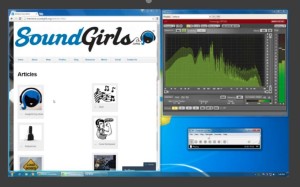Resources
Page 1 of 1
Sound Designers make everything you hear in a game except for dialog and music. They will use a DAW to create...
A spectrum analyzer allows you to observe a graphic representation of an audio signal’s amplitude and frequency response, shown in vertical...
The Production Sound Mixer controls recording levels, equalization settings, track assignments, media formatting and oversees the creative and technical operation of...
Audio engineers and audio techs in the world of broadcast are very different in terminology and context compared to live concert...
By: Gil Eva Craig You can divide sound for theater into three main areas: Sound Design: The Sound Designer creates the...
SoundGirls.Org member and blogger Kerrie Mondy has created this program. Knowing your frequencies is important not only in stopping feedback quickly...
SoulSound is a leading audio resource center for audio engineers, curated and delivered by live and studio audio professionals. SoundForums.net is...
Click on the links below for a description of each job. Concert Sound: FOH Engineers Monitor Engineers System Technicians, PA Technicians, Stage Technicians,...
Getting an Education There are many colleges and technical schools that offer degrees and education in audio engineering and music production....
Page 1 of 1

